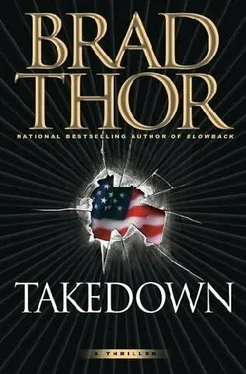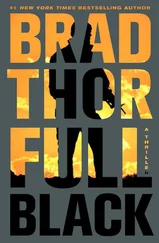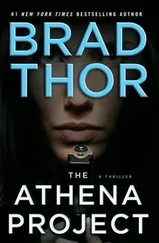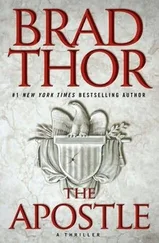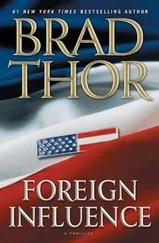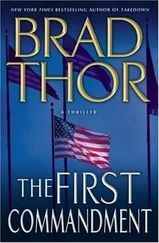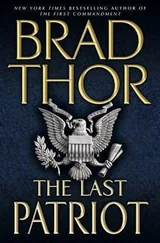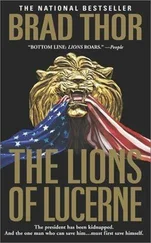Undeterred, Harvath stumbled up the ramp, and as his legs began to fail him, he willed them to keep going. He could not let the terrorists get away.
Out of breath, his chest heaving, Harvath hit the top of the ramp and pivoted to the left, the Cooper halfway down the block. Raising the weapon to his injured right shoulder, Harvath aligned the car in his sights and with no breath to hold, squeezed the trigger.
The rounds flew down 48th Street, and when Harvath saw the vehicle swerve, its brake lights illuminating the night, he knew he’d made contact. The tires squealed as it careened and scraped along several parked cars. Harvath lined up another shot, tried to control the desperate filling and emptying of his lungs, and then pulled the trigger again. He heard the distinct pop that indicated that he had fired his last round and without even thinking about it pressed the magazine release, slapped the new mag to make sure the rounds were seated, and slammed it into the weapon.
He ripped back the charging handle and let go of it just as fast. With the car nearing the end of the sidewalk, this was Harvath’s very last chance. Firing in short bursts, he kept the Mini Cooper in his sights as its driver swerved back and forth, trying to avoid being hit.
As Harvath began to squeeze the trigger once more, the vehicle hit First Avenue, pulled another tight left turn, and disappeared from sight.
The white-hot anger swelled up inside him once more. Based on the little he had seen, he knew these people were incredibly professional and would have put just as much effort into Mohammed bin Mohammed’s evacuation as they had his rescue.
It was a bitter pill to swallow, but Harvath had to accept that they were gone.
It was not Hastings or Cates who found Harvath propped up against a parked car and unable to move outside Libya House, but the receptionist.
Without saying a word, the man bent down and helped Harvath to his feet. When Harvath had trouble balancing on his damaged ankle, the man offered his shoulder. He tried to steer him toward the steps leading to the front of the building, but Scot shook his head and motioned toward the garage. At the bottom of the ramp, he thanked the man and told him to return to his post. What Harvath had to do now, he wanted to do without strangers present.
It took him several minutes to limp back to where he had left Hastings and Herrington, but when he got there he saw Rick Cates covering Bob’s body with a tarp. Cates looked up expectantly, and Harvath shook his head. He knew the question, and unfortunately the answer was no. He didn’t get the people who had done this to Bob.
Scot and Tracy and Rick stood there, staring down at the tarp, and said nothing. They had lost not only a teammate, but also an exceptional fellow soldier who was an even better friend.
There was no telling how much time had passed when Harvath finally said, “Let’s go back upstairs. I want some answers.”
The receptionist provided them with a keycard, but it got them only as high as the twenty-third floor. From there they walked up one more floor and realized why the freight elevator wasn’t working. Its charred doors stood wide open, and it didn’t take much of an imagination to realize what had happened. A severed hand and a lone Quantico boot with part of a leg sticking out of it, suggested at least one person, or probably more had been standing near the elevator when it exploded. What was left of the car was probably in the basement, and Harvath didn’t envy the forensic team that would have to go through it later.
As they continued on, each of the rooms they cleared was empty, until they reached the one that must have been used for bin Mohammed’s dialysis treatments. There they found another man-a marine, by the looks of him, who had taken a couple of severe blows to the head, but who was still alive. With no choice for the moment, they quickly made him as comfortable as possible and then continued with their sweep.
At the end of the hall, they found one last survivor-Sayed Jamal. He was Flexicuffed to a chair and had been beaten almost beyond recognition. Because this was Jaffe’s operation, Harvath didn’t need to recognize the prisoner to know who he was. He felt for a pulse and found one. It was weak, and even with immediate medical attention the man was probably not going to make it.
Leaving him alone, they went to clear their last and final room-the interrogation’s nerve center. After deeming it to be safe, they stared at the sophisticated electronic equipment as well as the dry-erase boards, the relationship diagrams, and the multiple photographs that had been taped up along the wall. Seeing one that bore a resemblance to the prisoner across the hall, Cates asked, “Is this what the guy in the other room used to look like?”
Harvath looked at the photo and nodded.
“They really did a number on him. Who the hell is he?”
“His name is Sayed Jamal. He’s an al-Qaeda bombmaker who-”
Suddenly, Cates spun around and seeing that Hastings was no longer in the room said, “Oh, shit!”
“What the hell’s going on?” demanded Harvath as Cates ran for the door.
“Sayed Jamal was the man behind Tracy ’s last bomb in Iraq.”
Harvath was about to echo Cates’s Oh, shit, when the crack of a single round being discharged in the interrogation room stopped him dead in his tracks. Without even seeing it, he knew that Tracy had killed him.
GRACE CHURCH
BROOKLYN HEIGHTS
JULY 10
Search-and-rescue efforts throughout New York City had turned to search and recovery. Because of the overwhelming number of dead needing to be buried, churches were conducting group funeral masses. But in the case of one of their distinguished parishioners, Grace Church had made an exception.
At a special request from the family of Master Sergeant Robert Herrington, traffic around the church had been blocked off by McGahan and several officers from various NYPD Emergency Service Units. The media respectfully kept their distance.
As a dark blue hearse rolled forward and came to a quiet stop in front of the church, a lone bagpiper played. Supported by his teammates, who had all been granted leave from Afghanistan to attend the service, Bob’s family watched as his flag-draped casket was removed from the vehicle and carried up the stairs by pallbearers in full military dress.
There were a significant number of soldiers in attendance, many from some of the world’s most elite fighting units-men Bob had had the pleasure of either training or fighting with. More than a few of them owed their lives to the brave man who had so tragically lost his life just a week before.
Some of the soldiers Harvath had known previously and some of them he didn’t, but he had gotten to know almost everyone the night before at Bob’s wake where, despite the sad circumstances and aided by lots of cocktails, everyone seemed to be able to come up with several funny stories about Bob. As a result, most of the tears that were shed were not tears of sadness, but actually bittersweet tears of joy remembering what a wonderful and inspiring person Bob Herrington had been.
For Harvath it was cathartic and something he desperately needed. His entire assignment in New York had been a catastrophic failure. Mohammed bin Mohammed had gotten away, as had the man who had been leading the Chechens, whom Harvath suspected was also the man who had helped spring Mohammed from Libya House, killing Bob Herrington in the process.
The SEALs have a saying that the only easy day was yesterday, but nothing about yesterday was easy, nor were any of the six days before that. For the last week, Harvath had remained alone, convalescing in his hotel room after having been patched up at the VA. He ran the operation through his mind again and again and again, each time trying to figure out a way he could have done things differently. No matter how hard he tried, he couldn’t think of anything he could have said or done that might have saved Bob’s life. This realization, though, did little to assuage his guilt.
Читать дальше
